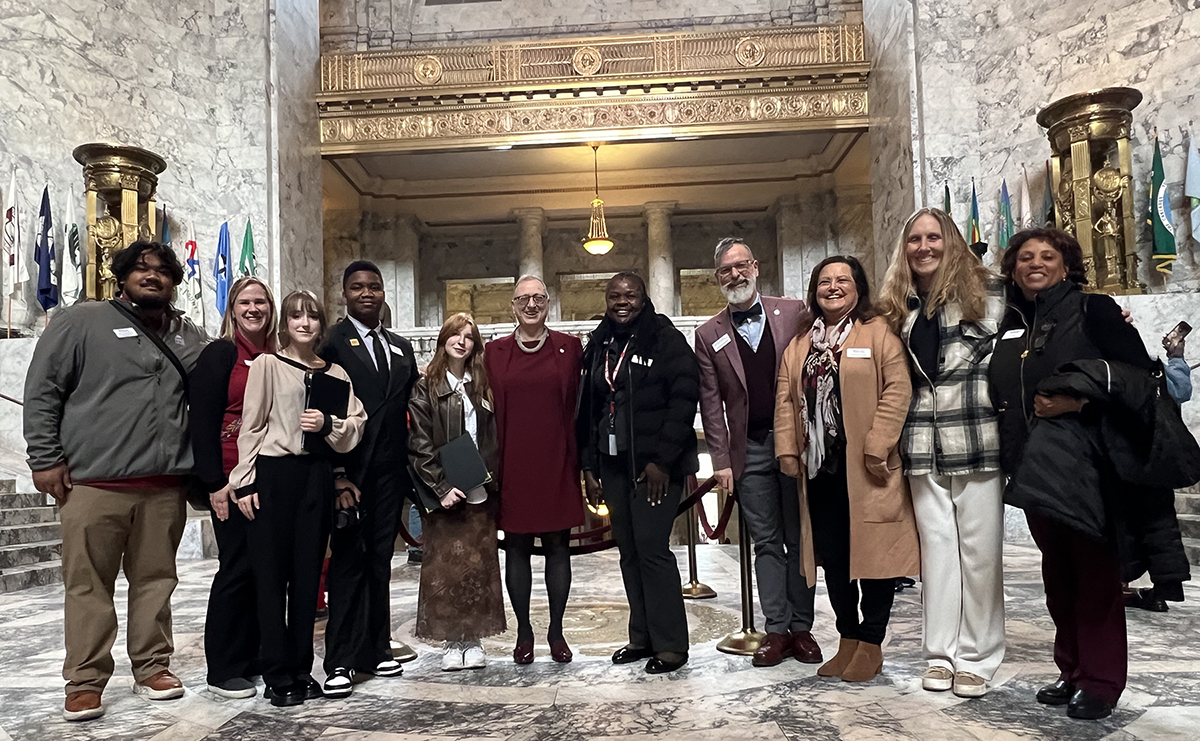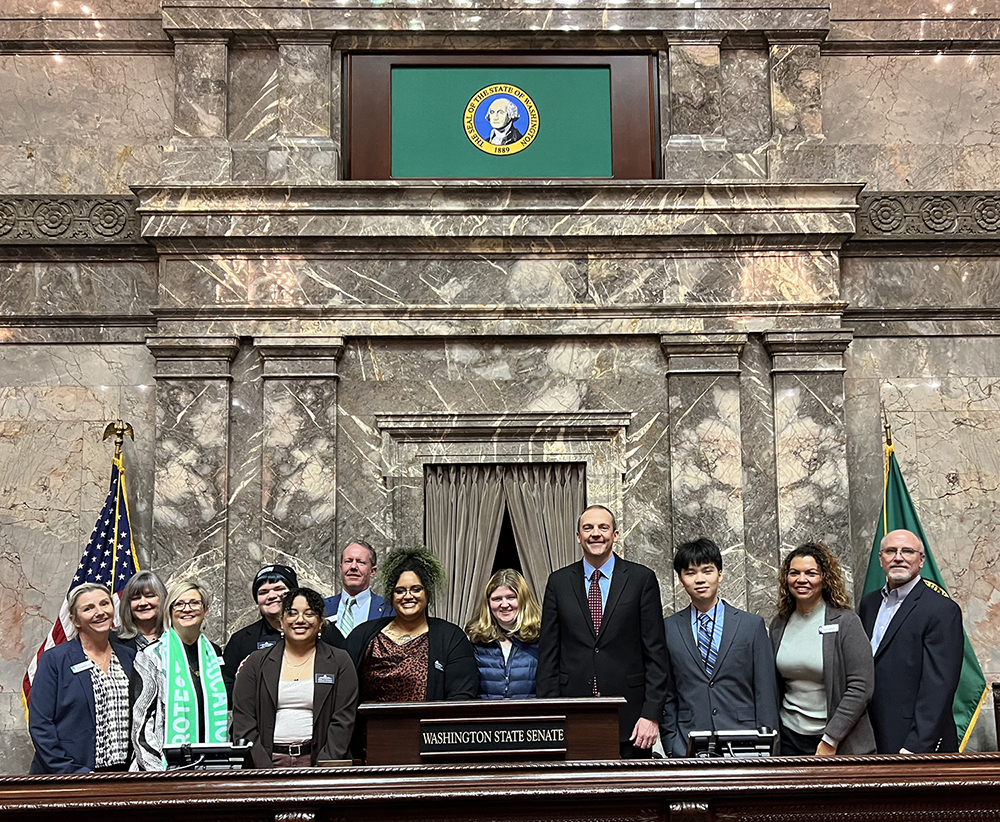Community and technical colleges were well represented in Olympia this week, sharing the success of the system's financial aid outreach pilot program and supporting bills that would expand Washington College Grant eligibility and helping high school students who are chronically absent. Presidents, trustees, and students were on the hill Thursday with partners from the four-year universities to meet with members in support of the state's colleges and universities.
Financial aid completion support program topic of Senate committee work session
Jan. 27 — Members of the Senate Higher Education and Workforce Development Committee held a work session Monday to learn more about the college system’s Financial Aid Outreach and Completion Pilot Program. The Legislature established the program in 2022 under HB 1835 to support the two Educational Service Districts (ESDs) with the lowest financial aid completion rates in 2019 to 2022 — ESD 114, which covers north Olympic peninsula and Kitsap peninsula, and ESD 123, covering southeast Washington. The program expanded in 2023 to include ESD 113, the capital region.
Legislation requires the colleges in those ESDs to employ outreach specialists to work with high school students and their families to boost FAFSA and WASFA completion and provide information about private scholarships. Eight community colleges are part of the pilot program: Big Bend Community College, Centralia College, Columbia Basin College, Grays Harbor College, Olympic College, Peninsula College, South Puget Sound Community College, and Walla Walla Community College. The Legislature appropriated nearly $2 million to the program since the pilot’s inception, allowing colleges to hire 24 specialists who worked with 10,089 students in the 2023-24 school year.
“HB 1835 is aimed to boost financial aid awareness and application completion among students by embedding outreach specialists in high schools to provide high touch support and navigation assistance to students completing financial aid [applications],” Jamie Traugott, student services director with the State Board, told committee members.
Alyson Rotter, associate dean of K-12 partnerships and outreach at Olympic College, explained how her college’s specialists developed their strategies to work within their area high schools’ existing operations. Under the multi-tier systems of support framework structure, about 80% of students would be able to complete a financial aid form following a broad approach like a financial aid night. The next step, reaching about 15% of students, would involve more support like small group sessions with the outreach specialists. The final 5% would require at least one one-on-one support meeting with students and a specialist.
“Where our financial aid specialists really hone in on is doing small group workshops, small groups of students in counseling and career centers, maybe classroom presentations tied to advisory periods or other college and career planning sessions,” Rotter said.
Speaking to challenges, Traugott told committee members that FAFSA completion rates dropped for the 2024-25 school year, from 48% to 43%, likely because of problems with the U.S. Department of Education’s FAFSA rollout. The department introduced a revised FAFSA in the last days of December 2023, nearly three months later than the form’s usual open date. While the rollout fulfilled the Congressionally-mandated deadline for the form’s release, students, families, and colleges continued to face significant challenges for much of the first half of 2024.
“If we didn't have these outreach specialists, I think we would be an even a worse spot than we are now,” Traugott said. “They are incredible advocates for our students and also helping families that also might want to go to college and can directly influence them.”
Rotter suggested ways to improve the program, including technology to better track contact with students and monitor their progress, as well as support for the State Board organizing professional development opportunities for outreach specialists.
“I think one really significant asset of the State Board is helping manage the pilot sites, even without the resources … is getting everybody together in the summer to talk about this in terms of best practices so that we're learning from each other. You start to see some more uniformity with what's working and what's not working among the pilot sites,” she said.
Two bills introduced this session could expand the program statewide. The Senate Higher Education and Workforce Development Committee heard testimony on SB 5164 during its hearing Jan. 16, voting Jan. 30 to move it to the Ways and Means Committee.. A similar bill in the House, HB 1136, was heard in the Postsecondary Education and Workforce Committee Jan. 17 and approved Jan. 28 to move to the House Appropriations Committee.
Bill supporting students with chronic absences heard in Senate early learning committee
Jan. 28 — A bill designed to support students who are chronically absent and at risk of not graduating from high school was up for a hearing during Tuesday’s Senate Early Learning and K-12 Education Committee meeting. If passed, SB 5007 would require every Educational Service District to train and coach staff to address excessive absenteeism and truancy. It would also add support for those students by adding them to the Building Bridges Program, local partnerships of schools, families, and communities, as well as adding services and resources to the Open Doors, a statewide dropout reengagement program. A similar bill passed the Senate in 2024 but died in the House Appropriations Committee.
“All this bill does is to give some basic tools to parents, to administrators, to teachers in the form of training, in the form of grants, in the form of tracking, [getting] kids back on track to deal with the problem,” Sen. John Braun, the bill’s prime sponsor said.
Will Durden, director for basic education for adults at the State Board, spoke in favor, speaking to the Open Doors Program section of the bill. Through that program, the community and technical college system works with the Office of the Superintendent of Public Instruction to reengage youth or youth with too few credits to graduate from high school to help continue their education.
“It just helps us provide more supports to the students who need it most,” he said.
Isabella Flores, a legislative intern with the State Board, also testified in favor of the bill, telling senators how absences often lead to students feeling disconnected, unsupported, and unsure how to catch up with their schoolwork.
“Many students face challenges outside of their control like transportation issues, housing, instability, or family responsibilities. This bill is important because it acknowledges these challenges students face and offers solutions,” she said. “By identifying patterns of absenteeism and understanding the underlying causes, we can make certain that schools have the necessary support and resources to prevent them from falling through the cracks.”
College representatives on the hill for Advocacy Day
Jan. 30 — Over 100 community and technical college students, faculty, staff, presidents, and trustees, along with representatives of the four-year universities and other higher education advocates, were on Capitol Hill Thursday in support of the state's colleges and universities. They met throughout the day with their representatives and senators to share the importance of education past high school to the success of the state.



Bill expanding Washington College Grant heard in Senate higher education committee
Jan. 30 — Members of the Senate Higher Education and Workforce Development Committee heard a bill Thursday that would expand eligibility for the Washington College Grant. Under the bill, SB 5402, students earning 0% to 70% of the Washington state median family income would be eligible for the grant's maximum award. Under current law, the maximum award is available to students earning 0% to 65% of the state median family income. The bill would also change thresholds for partial awards and provide $500 grants to low-income students for cover higher education expenses outside of tuition and fees.
“We cover part-time students as well as full-time students. We cover adult students in their 20s, 30s, 40s, 50s, no age limit, not just students right out of high school. We cover four-year universities as well as community colleges, but this work is not yet finished,” Sen. Drew Hansen, the bill’s prime sponsor said.
Testifying in support of the bill on behalf of the community and technical college system were Jessica Perez, a student services policy associate with the State Board, and Khanh Pham, a legislative intern with the State Board.
“This increase will help to further close funding gaps that our students face making higher education more affordable for a broader range of students,” Perez said. “By providing additional financial support, this may also reduce students’ reliance on federal and-or state loans which thus eases the burdens that they may face financially once they do complete their degree or their certificate.”
Pham, who in 2022 immigrated with his family to the United States from Vietnam, told senators that the Washington College Grant allowed him to attend South Puget Sound Community College, helping him achieve his goal of being the first in his family to earn a bachelor’s degree.
“Through my experience, I learned that when students can afford their course material and basic supplies on day one of class is when we can truly put all of our energy into learning and achieving our academic goals,” he said. “I am living my family's American dream through education, but many of my fellow immigrant classmates and friends have had to pause the dream due to financial barriers.”
Coming up next week
Committee meetings continue next week with bills on adding a student to community and technical college boards of trustees and expanding financial aid eligibility up for hearings. The college system-requested bill to create a tuition waiver for Tribal elders is slated for a hearing in the Senate Ways and Means Committee on Monday. On Thursday, members of the Senate Higher Education and Workforce Development Committee are scheduled to hold a work session to learn more about the system's Basic Education for Adults programs.